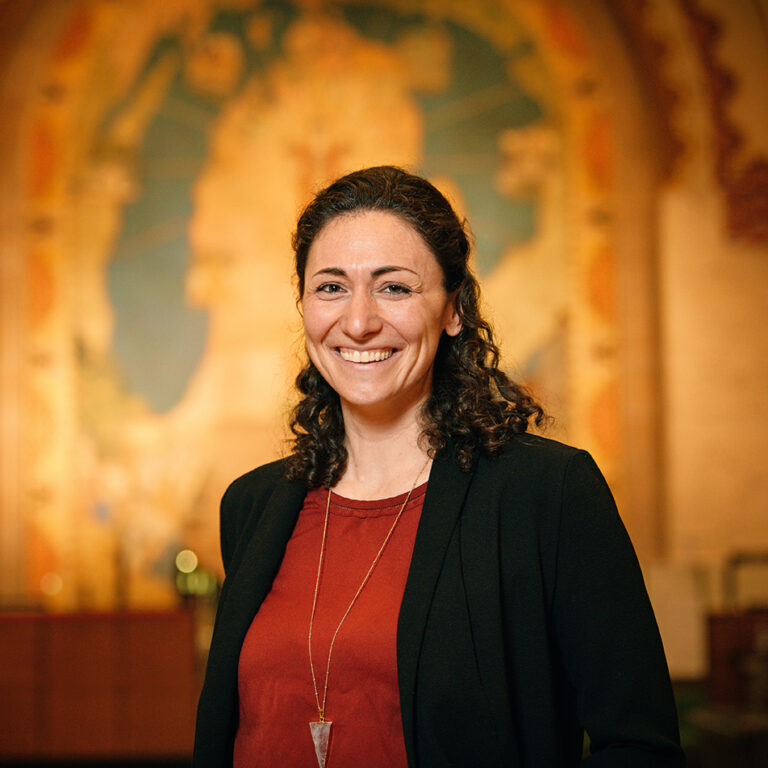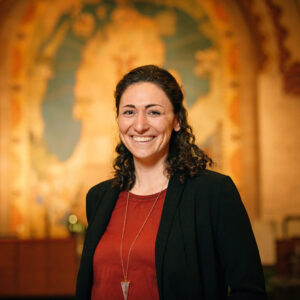
Lily Hamburger

Lily Hamburger
Lily Hamburger, who earned her MBA from the Ross School of Business in 2016, serves as the director of the business support network office at Invest Detroit, a Detroit-based lender, investor and partner that supports business and real estate projects in Detroit and the region. We connected with her recently to find out about her impact journey and learnings along the way.
Can you describe what you’re doing with Invest Detroit?
We are 100% funded by the New Economy Initiative to foster and encourage an inclusive network of support services and funding for small business owners and entrepreneurs in Wayne County. We are charged with feeding the NEI with market intelligence about what small business owners need and how the network is or is not meeting those needs.
It’s a really fun job that involves building a community with dedicated nonprofit professionals and small business owners, architecting systems to gather and report on data, advocating for underserved communities, and building innovative solutions to solve problems.
For example, I facilitate gatherings of staff from business support organizations to discuss how we are meeting the needs collectively in particular areas such as access to commercial space, digital acumen, access to capital, and others.
These groups have spun off tangible solutions, such as a pilot project that just launched to change the way micro lenders gather documentation from small business borrowers. We know that entrepreneurs of color were less likely to access pandemic relief programs because, while their businesses are sound, they didn’t have as strong documentation to apply for funding. Solving this will help small businesses grow, but is also going to address the racial disparity in the capital system.

Describe your journey from school through Detroit Economic Growth Corporation to Invest Detroit. Did this journey help to fine-tune your impact niche?
I came to Ross in search of how business and capitalism could be leveraged to create social justice and equity of economic opportunity for people after working in grassroots nonprofits in the U.S. and abroad. After participating in the MBAs Across America Fellowship, I saw supporting small business as an opportunity to uplift a kind of entrepreneurship and business practice that is grounded in community, creates local jobs and Main Street level vibrancy and opportunity for everyone.
I was simultaneously falling in love with Detroit, so my network there landed me at DEGC. I learned so much working at DEGC; it was sort of a thrilling ride. I held several positions where I was designing new programs like Motor City Re-Store (now part of Motor City Match), a citywide retail demand study, and the start of the District Business Liaisons.
I had the privilege of working closely with the mayor’s office and city government and collaborating with this network of nonprofit support services for small businesses that I am now facilitating for NEI. In my last role at DEGC, I was helping to stand up Detroit Means Business, which was a response to the pandemic trying to create a “front door” to small business resources.
I am certainly still fine-tuning my “impact niche,” but it has been very focused on Detroit’s resurgence, the racial equity of urban development, the way that small businesses fit into neighborhood and community development, and the power of many organizations coming together to create something bigger than the sum of their individual parts. I have learned so much in my career since Ross about real estate, economic development, Detroit (which is not my hometown), and managing teams; now in this phase of my journey I’m diving more into philanthropy, small business finance, and how to measure collective impact.
What are some of the trends you’re seeing in Detroit small businesses these days? What are some financial and funding challenges?
The pandemic ravaged small businesses globally, but it also exposed issues that were under the surface the whole time and made it easier to address them head-on. I mentioned above the example of financial documentation — there is so much structurally that holds back businesses owned by people of color, and the network I am a part of is hoping to turn that upside down.
Since the pandemic, or in this phase of it, the talent market has been a huge challenge, as well as inflation and rising interest rates. Our network is working on filling in some of the gaps in financial readiness, digital acumen, access to commercial property, and access to corporate and government contracts particularly for the smallest of small businesses (with 10 employees and under), and for people of color.
One of the things I am trying to learn about is how other communities are using innovative financial tools to support small business growth. Business owners are also telling us they need more marketing support — this post-pandemic economy is still hitting the food and retail industries really hard, which has a big impact on neighborhoods in Detroit and other Wayne County communities nearby.

How have you leveraged your U-M MBA and co-curricular experiences in your current position or previous positions? Is there a part of your education that has surprised you by taking center stage in your work?
I have been a career nonprofit person. I feel like I got exactly what I needed from my MBA, which was to understand the language of business. I am not an expert in accounting or marketing strategy, but I know enough to be dangerous! Sometimes I find myself even visualizing my Ross classrooms when I get into technical conversations. But mostly it is the organizational management stuff, the working in teams, the structures of how to think about a problem, and some of the “softer” people skills that have come in handy the most. I also draw upon lessons from extracurricular stuff such as Ross Leaders Academy, Center for Positive Organizations, and of course MBAs Across America.
Do you have any advice for current students aiming to make a career in the social sector?
There were days at Ross when I recall it feeling like swimming against a tide to be pursuing something “off campus” or “in the impact space.” My advice is to remember that there is a big wide world out here and lots of applications for the talent you have and the education you’re receiving, not only in the companies that come to campus. Real impact happens in so many places. Take the time to look outside the walls of the Ross Winter Garden. Reach into that alumni database as a starting point. Find someone with an interesting title or an organization with an interesting mission and just start talking to people.

